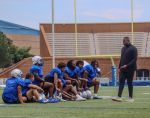Diddy's Companies Removed From Dawn Richard's Lawsuit
Diddy’s Companies Removed From Dawn Richard’s Lawsuit But Legal Fight Isn’t Over

Diddy has been sneakily catching small legal victories since getting dismissed of the most serious charges of sex trafficking and racketeering, and he may have just scored another.
Among the mounting lawsuits he faces, one comes from Dawn Richard, who participated in Making the Band 3 and later became a member of the Dirty—Dirty Money trio.
Now his former bandmate, who has long accused him of abuse and exploitation, is updating her complaint by dismissing 10 of the companies she initially named, according to documents reviewed by AllHipHop.
They include Daddy’s House Recording Studio, Bad Boy Entertainment LLC, Bad Boy Records LLC, Bad Boy Entertainment Holdings Inc., Bad Boy Productions Holdings Inc., Bad Boy Books Holdings Inc., 1169 Corp. (formerly Sean Combs Music Inc.), Sean Combs Capital LLC, CE OpCo LLC (formerly Combs Enterprises), and UMG Recordings Inc.
However, the fine print reveals that her legal team dismissed the claims without prejudice, which means she can refile. Plus, the complaint still names him, Harve Pierre, Janice Combs Publishing Holdings, Inc., Janice Combs Publishing LLC, and Love Records, Inc.
Again proving the legal fight isn’t over, her lawyers say they plan to file a second amended complaint.
Diddy’s side did come away with a win, saying that she dropped her human trafficking claim and calls her continued fight “futile.”
Richard’s initial claims were filed at the beginning of the year in a $3.5 million lawsuit against the Hip-Hop figure, and also accused him of forced labor. She alleged nightmarish conditions, like being trapped in a Maybach with him while she was berated, and being groped and forced to strip during rehearsals.
In return, Diddy’s team downplayed her allegations, saying that “Even if the outrageous facts alleged were true (they are not), they do not support Richard’s claims” and at most she can allege being “underpaid and subjected to difficult work conditions, which do not constitute forced labor.”
Plus, even if the alleged claims are valid, many of them date back to 2007 to 2011, which means they’ve passed the statute of limitations.








